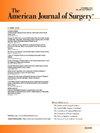Integrating artificial intelligence into scientific writing: a narrative review for clinical and surgical researchers
IF 2.7
3区 医学
Q1 SURGERY
引用次数: 0
Abstract
Artificial intelligence (AI), particularly large language models, is reshaping academic and clinical research by supporting key stages of the scientific writing process, including idea generation, literature review, drafting, and revision. Tools such as ChatGPT enhance efficiency, clarity, and accessibility while assisting with hypothesis development, evidence synthesis, data analysis, and figure generation. This narrative review examines the benefits, challenges, and ethical considerations of AI-assisted scientific writing, with emphasis on medical and surgical research. While AI tools streamline manuscript preparation when effectively prompted, they also pose risks such as hallucinations, biased outputs, plagiarism, and reduced critical engagement. Concerns have emerged regarding overreliance and diminished scholarly autonomy. Editorial policies increasingly require transparency and human oversight. To ensure responsible use, structured training for researchers and reviewers is essential. AI should be seen as an augmentative tool that complements—not replaces—human expertise, offering opportunities to broaden access to publishing and promote equitable participation in scientific discourse.
将人工智能融入科学写作:临床和外科研究人员的叙事回顾。
人工智能(AI),特别是大型语言模型,通过支持科学写作过程的关键阶段,包括想法产生、文献综述、起草和修订,正在重塑学术和临床研究。ChatGPT等工具在协助假设开发、证据合成、数据分析和图形生成的同时,提高了效率、清晰度和可访问性。这篇叙述性综述探讨了人工智能辅助科学写作的好处、挑战和伦理考虑,重点是医学和外科研究。虽然人工智能工具在有效提示下简化了稿件准备,但它们也带来了幻觉、有偏见的输出、抄袭和减少批判性参与等风险。对过度依赖和减少学术自主权的担忧已经出现。编辑政策越来越需要透明度和人为监督。为了确保负责任的使用,对研究人员和审稿人进行结构化的培训是必不可少的。人工智能应该被视为一种辅助工具,可以补充——而不是取代——人类的专业知识,为扩大出版渠道和促进科学话语的公平参与提供机会。
本文章由计算机程序翻译,如有差异,请以英文原文为准。
求助全文
约1分钟内获得全文
求助全文
来源期刊
CiteScore
5.00
自引率
6.70%
发文量
570
审稿时长
56 days
期刊介绍:
The American Journal of Surgery® is a peer-reviewed journal designed for the general surgeon who performs abdominal, cancer, vascular, head and neck, breast, colorectal, and other forms of surgery. AJS is the official journal of 7 major surgical societies* and publishes their official papers as well as independently submitted clinical studies, editorials, reviews, brief reports, correspondence and book reviews.

 求助内容:
求助内容: 应助结果提醒方式:
应助结果提醒方式:


